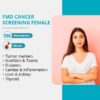- Your cart is empty
- Continue Shopping
‘All tests we do at FMD are aimed at finding the root cause of your health problem. These are not the usual diagnostic tests that you do, but much, much more.’
‘All tests we do at FMD are aimed at finding the root cause of your health problem. These are not the usual diagnostic tests that you do, but much, much more.’

₹9,724.00 ₹8,840.00
₹9,724.00 ₹8,840.00
Test Parameters:
Cancer is a chronic disease in which some body cells grow uncontrollably and harm or causes damage to the body tissues by spreading to other parts of the body.
 Fasting Time: 9 to 12 Hours
Fasting Time: 9 to 12 Hours Reporting Time: 2 or 3 Days
Reporting Time: 2 or 3 Days Best and Honest Price
Best and Honest Price Free Home and Office Collection
Free Home and Office CollectionFMD Cancer Screening Female will provide important information regarding:
Our Working Process Healthcare model is shifting from Sickness care to Wellness.
Sample collection will be done from home

Sample is processed at Central Lab of our Trusted Partners.

Reports are accessible online.
Sample collection will be done from home

Sample is processed at Central Lab of our Trusted Partners.

Reports are accessible online.
FAQ's Functional Medicine FAQ's
There are basically 4 stages to cancer and as the stage increases the severity also increases.
Stage 0- At this stage, the condition is not cancer but there is growth of abnormal cells which can become cancer cells if not taken care of.
Stage 1- At this stage, the cancer cells are very small and are concentrated to one area.
Stage 2 and 3- At these stages, the cancer cells have become larger and are spreading towards nearby tissues and lymph nodes.
Stage 4- At this stage, the condition is worse as the cancer cells have spread to other parts of the body causing harm to the tissues.
Other Popular Test Packages Choose from our frequently booked test packages.